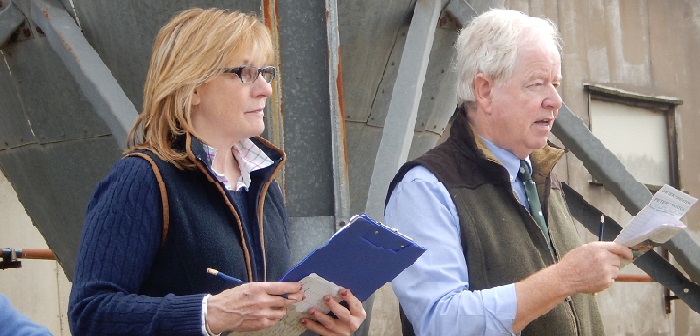With sheep prices going through the roof and a very firm demand for cattle, it is a crying shame that pig prices seem unable to follow suit.
The latest SPP is now 147.34p having slipped by 1.15p since Christmas. Weekly contribution prices are also forecast to follow a similar downward path losing in the region of 2p and prices in this sector are expected to be within the 132p-135p range.
The spot bacon trade is virtually non-existent and for those producers unlucky enough to have additional pigs which must be cleared, prices are unlikely to be any better than 120p, though regular sellers should be closer to 130p.
Although German producer prices have held for the last 6 weeks at 1.19 EUR, in Sterling terms this works out at no more than 106p/kg, which explains why foreign imports are continuing to undercut domestic prices by a country mile. At least the value of the Euro has held at similar levels on the week, trading on Friday at 89.9p.
Cull sow prices have always provided a useful barometer to pig meat values in the EU and based on the recent collapse in cull sow values, coupled with the additional post Brexit paperwork and bureaucracy involved as well as the challenge for some of the larger EU abattoirs meeting Covid regulations in terms of working space, cull sow deals have dried up to a trickle and are nowhere near their pre-Christmas value two weeks ago.
Weaner prices continue to reflect falling pig meat values across the board and the latest AHDB 7kg average of £38.52/head is well ahead of spot trades but, in the case of Red Tractor pigs, it is difficult to find buyers other than at knock down prices.
The soaring cost of straw which is changing hands at around £100/tonne is also adding to producers’ problems and red ink bank statements, with usage rates on the high side following on from the recent periods of wet weather and forecasts of more to come.
Sky high feed prices are continuing to add to COP levels with UK feed wheat traded at £210/t for February and £166/t for September.
Feed barley prices have also followed this upward trend trading at £162/t for February. Just to add to the pain, protein costs have also soared, with Hipro soya traded for February at £428/t.
Reports of below average rainfall in South America and speculative demand pushing up prices are also underlining that dearer feed costs will have to be faced in the months ahead in what is already a very troubled New Year.
And finally, the new post-Brexit era has now dawned with the UK now classified as a ‘third country’, although as far as the pig industry is concerned it is more like a ‘third world”’country.
Pork imports and exports are a vital part of the overall pig meat supply chain in the UK. Although UK trading is tariff free, reports have already been received in connection with additional bureaucracy and costs associated with the UK pig meat export trade and there have already been additions to the length of red tape required, leading to long delays at ports which is hitting the shelf life of pork products.
Until a way can be found to reduce pig meat export delays the cull sow market has virtually ground to a halt, not helped by slow inspection procedures at French ports with the result that some UK pig meat soon becomes out of date and perishes.
As someone once said: “The French are always there, and they need us!”




